
 photo credit: Eric Schwartzman
photo credit: Eric Schwartzman
I’ve spent months writing about how to effectively use technology, and social media in particular, to build your private mental health practice. While the Internet has opened up exciting new ways for mental health therapists in private practice to market their practice, reach potential clients, and educate the public, it has also allowed for new ethical dilemmas.
When I first started practicing nearly two decades ago, I was concerned about my child being on the same soccer team as a client's child, or about running into clients at parties of mutual friends. The increasing Internet usage by therapists and clients alike has created new opportunities for dual relationships online. Over the coming weeks I'll be discussing ways to use social media ethically in the digital age.
Here are a just few examples of digital dual relationship dilemmas that therapists now face:
- “A former clients sent a ‘friend’ request on my personal Facebook page? Should I accept it?”
- “One of my clients is a friend of one of my family members on Facebook. I don’t want him to have access to my personal information, photos, etc. Is there anything I can do to protect my personal information?”
- “A client just posted a comment on my private practice Facebook page that reveals some clinical information about his symptoms. How should I handle this?”
- “A potential client sent me a direct message on Twitter inquiring about my therapy services. Is Twitter confidential? How should I respond?”
- “During an initial intake with a new client the client shared some grandiose facts about her successful work history and public accolades. Should I Google her name to see if what she’s reporting is true?”
- “I just saw that a client is following me on Pinterest. I’m not sure how I feel about her seeing boards about how I want to decorate my dream house.”
- “Should I enable or disable comments on my private practice website blog? I'm concerned that it may look like I'm encouraging clients to comment on my blog."
I want to hear from you...
Have you faced any of these situations in your clinical practice?
What are some ethical dilemmas you've come across since venturing into social media?
Do you have any specific questions or ethical concerns about the impact of your online activity and it's potential impact on the client-therapist relationship?



As healers, we genuinely like to do our work. Guiding clients through the therapy process and seeing them make progress is why we do what we do. But if you're in private practice, you know there's a lot going on in the back end and that it's crucial to run an efficient and organized business.